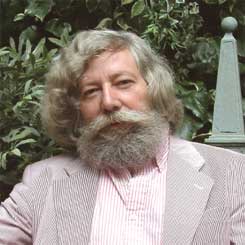|
|
 |
| |
Connolly goes back to the 50s
Joseph Connolly, one of London’s most popular and prolific authors has just published a major new novel. He spoke about it to Lew Matthews
Love is Strange by Joseph Connolly, Faber & Faber, £12.99
order this book
THE 1950s was an awkward decade in a Britain still recovering from the social and economic privations of the war.
The population was just beginning to taste the promise of the consumer society and glimpse the future through television, and the results of the post-war baby boom were just beginning to push at the boundaries of a hitherto hidebound society.
It is a world remembered in flawless detail by Joseph Connolly in his remarkable new novel, Love is Strange. It is as if he has dipped his pen into a stream of memories that will strike a loud chord with anyone who lived through the period, or will provide a vivid picture to others. Connolly appears to have moved decisively away from his earlier highoctane, frenetic comedies and, as with his last book, The Works, published in 2003, the tone has now become darker, more serious – but no less irreverent and outrageous, and certainly no less enjoyable.
The book starts, startlingly, with a chapter called The End, in which the narrator, Clifford, convinced that he is about to die, plunges into memories of his life from the age of eight, growing up in an apparently ordinary middle-class family in London. But, as with even the quietest patches of water, there is always another world going on underneath which may be nothing like as placid as the surface would suggest.
“I have been unconsciously storing up the past, and particularly the 1950s,” Connolly told me at his home off Fitzjohn’s Avenue, Hampstead.
“I found that when I started writing the 1950s stuff that it just sort of fell out of me; it was almost as if a tap had been opened, and although it’s not my past that I have written about in this book, it certainly is the world of my past,” he said.
He was born at the beginning of that decade, in Fitzjohn’s Avenue and by the 1970s he was the proprietor of the famous Flask Bookshop in Flask Walk when there were 10 bookshops between the Tube and the police station down the hill.
books too, the first being a guide to collecting first editions, and then biographies of PG Wodehouse and Jerome K Jerome, before he wrote his first novel in 1988.
Eight more novels have followed, including the exquisitely comic Summer Things, which has sold well over 100,000 copies and was made by a French director into an award-winning film starring Charlotte Rampling which was on general release in London last year. But it was clearly time, now, for the 1950s to come bursting out. “I deliberately didn’t do any 1950s research, because I didn’t want some kind of slab of knowledge stuck in,” he says. “It was all what I actually remember, and I can remember the sights and smells and the touch of things more clearly right now than I can things just a few years ago.”
And so, those of us who are old enough to remember, are re-acquainted delightfully with all the toys that arrived in cereal boxes, the brands of soap and bottled drinks, those nasty rubber-topped bottles of glue, the comics, sweets, early television programmes, slogan on the Tubes of Pepsodent toothpaste and many other things besides – although these details are, in a way, incidental to the plot of the book.
“What I have tried to get across was not just lists of products and things, but the tremendous importance they had to children in those days,” he says. “If your mother was going to buy a box of cereal you would be utterly jittery about what little toy or gadget was going to be inside; these things sort of took you over. And then there was the peer pressure everyone was under because there were certain things you just had to have.”
Parts of the story is narrated by other members of the family – the inadequate father, the (apparently) timid housewife and Clifford’s wayward sister, Annette, who is subjected to the most brutal treatment by nuns, and priests, at a convent school. It is not by any means a complimentary view of the Catholic church.
“What I wanted to do here was to reflect the horror of this great shield of purity that these church institutions held up, things that because they did them all their lives they almost came to believe themselves,” he says.
The plot gallops forward some decades, and it all gets much darker, with the characters becoming more accepting of things that in the 1950s would have shocked them to their core. And the reader should not expect the ending to be joyous although it is not short of drama and surprise.
Connolly is in some ways an old fashioned writer, and he doesn’t even use a typewriter. He writes by hand with a fountain pen in foolscap notebooks (which are not easy to find nowadays). He sits down to start writing. “When I start it is with a low moan inside me because I realise there will be no more long lunches until I finish, and the bloody characters are going to take me over,” he says.
“But I like having written; there is no better feeling than that.”
|
|
| |
|
 |
|


